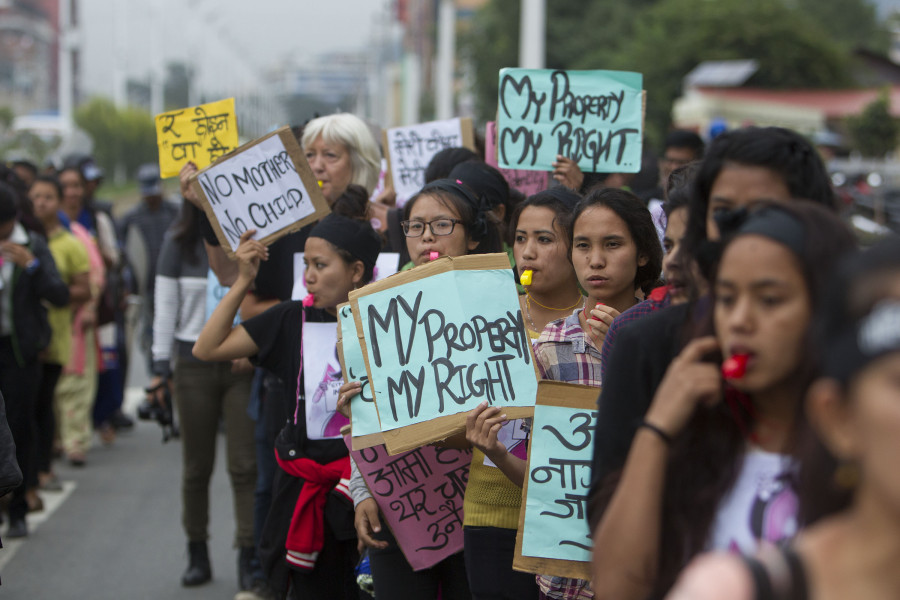National
Debate over Nepali women’s right to pass on citizenship to children reignites as House Committee holds discussions on controversial provisions
Activists say lawmakers’ reluctance to grant equal citizenship rights to women is reflective of the deep-rooted patriarchal beliefs in society.
Tsering D Gurung
The debate over the Citizenship Amendment Bill has reignited after the Parliament’s State Affairs and Good Governance Committee agreed to pass a controversial provision which rights activists say will further curtail a woman’s right to pass on citizenship in her name to her children.
On Thursday, the committee, chaired by a ruling Nepal Communist Party leader, agreed on a provision which states that a child of a female citizen can obtain citizenship by descent in cases where the father’s identity is unknown, after the applicant provides an explanation and if the government maintains an official record stating the same.
The issue of citizenship by descent is an extremely sensitive topic and any decision involving the amendment of the bill must be taken with caution, Nepali Congress lawmaker Dilendra Badu said during the meeting.
“We can’t trust a woman’s verbal declaration that the father’s identity is unknown, so we have to have it on record,” Badu later told the Post in a phone interview.
Earlier on Monday, the committee had tweaked the phrase from “provide proof of father’s identity being unknown” to “provide an explanation”. Women’s rights activists say it is a cosmetic change in the language that does not mean anything.
During Monday’s meeting, the patriarchal attitude of lawmakers was on full display, where several leaders opposed the proposal to remove a provision that asks women to provide proof that the identity of the child’s father is unknown. Some lawmakers said doing so would enable women to lie about their partner’s identity and lead to a rise in “immoral conduct.”
“Why should we issue citizenship if they can’t provide evidence that the identity of the father is unknown?” Dilendra Badu, a Nepali Congress lawmaker told the committee. “How can we trust a woman’s declaration that the father’s identity is unknown?”
Jhapat Rawal of the ruling Nepal Communist Party issued an even more sexist statement.
“If a child born out of rape doesn’t have to identify their father, then rape cases will increase,” Rawal said in the meeting. “Children will lose their right to know their father’s identity and this will also lead to women indulging in immoral acts.”
The news has disheartened lawmakers and activists who have been demanding the provision to be removed from the bill, arguing that it is an affront to a woman’s dignity and a clear violation of the right to privacy.
The bill, which seeks to amend the 2006 Citizenship Act, was tabled last June and attracted widespread criticism from activists and lawmakers for its failure to address unequal provisions in the current Act.
Following the bill’s presentation in the House, lawmakers had registered 23 amendments to the bill, which are now being discussed in the committee.
Women’s rights activists say Nepal’s Citizenship Act is problematic because it propagates inequality.
“Why are there so many “ifs” and “buts” attached to a woman’s right to pass on citizenship to her children?” said Deepti Gurung, a longtime campaigner for equal citizenship rights. “Why are women of this country treated like second-class citizens?”
While technically a child born to a Nepali female citizen can obtain citizenship in mother’s name, the law has been peppered with several conditions that make it virtually impossible to be able to get a citizenship in the mother’s name, they argue.
For instance, a child born to a Nepali female citizen from marriage with a foreign citizen in Nepal may be granted naturalised citizenship, but only after producing proof that the child has not acquired the citizenship of his father’s nation. These conditions do not exist for a child born to a Nepali male citizen from marriage with a foreign national.
Similarly, as per Subsection 5(1) of the Act, a foreign woman married to a Nepali male citizen can obtain naturalised citizenship provided she submits the required documents including marriage registration certificate and evidence of initiation of the process to revoke her original citizenship. But there is no similar provision that allows a Nepali female citizen to pass on citizenship to her foreign spouse.
In an interview with the Post, lawmaker Binda Pandey said the law’s failure to recognise a woman’s lineage goes against the values enshrined in Nepal’s constitution.
“If we are to make laws in accordance with the constitution, then we should acknowledge that both mother and father are equal in terms of lineage,” said Pandey. “Just as children can easily get citizenship through their father’s name, same should be the case for mothers.”
Those opposed to amending the law to enable Nepali women to pass citizenship to their children argue that easing provisions will lead to an influx of foreign nationals gaining Nepali citizenship and threaten Nepal’s sovereignty and security.
“Given the geopolitical state of Nepal and our open border policy, we cannot afford to be lax about our citizenship laws,” said Surya Nath Upadhyay, former chief of anti-graft watchdog chief, who has been leading a pressure group to demand more strict citizenship laws. “We don’t want foreigners coming in and leading the country, do we?”
Upadhyay refused to acknowledge the country’s citizenship law is unequal saying these are matters for discussion to be brought up during amendment of the Constitution.
“If we are talking about equality, why do we need 33 percent quota for women in the parliament,” said Upadhyay.
Last month a group led by Upadhyay met with Krishna Bahadur Mahara, the Speaker of the House, to urge him to withdraw the Nepal Citizenship Bill arguing it would allow foreigners to obtain Nepali citizenship.
Activists say they are not against strict laws but condemn the discrimination that has been meted to the country’s women in the name of national security.
“There has been an attempt to suppress the women of the country by evoking this unsubstantiated fear about our neighbouring countries taking over,” said Gurung. “These xenophobic policies are affecting thousands of children whose rights to free movement, education and work have all been violated.”
Gurung herself was forced to move the court after the Kathmandu District Administration Office declined to issue citizenship to her daughters in her name.
She filed a case against the district office in the Supreme Court and won. While her daughters have been granted citizenship, Gurung points to a line at the back that reads: “This citizenship was issued under special conditions as per a Supreme Court decision.”
“Why do we need to distinguish this as “special” citizenship?” Gurung said.
More than four million Nepalis who are eligible for citizenship do not have citizenship certificates, according to a 2013 study by the Forum for Women, Law and Development.
Subin Mulmi, an advocate with the organisation, says this is a direct result of the discriminatory provisions that have rendered children of single mothers stateless. Another issue Mulmi says is the pervasive mindset among government officials that citizenship should be granted only through fathers.
“Despite the law having certain provisions for women to pass on citizenship to their offspring, most of the times such applicants are denied their rights by officials on baseless grounds,” said Mulmi.
The forum has represented several cases of individuals who have been denied citizenship in their mother’s name and won.
Nepal also has obligations to the world as a party to international treaties, including the Convention on the Elimination of All Forms of Discrimination Against Women (CEDAW), the Convention on the Rights of the Child (CRC), the International Covenant on Civil and Political Rights (ICCPR), among others.
Pandey, the lawmaker who has been leading the fight for equal citizenship rights for decades, says the current debate represents the patriarchal mindset in many leaders who refuse to accept that men and women are equal.
“Theoretically they support gender equality,” Pandey said, “but they can’t bring themselves to believe that men and women can be equal.”




 18.12°C Kathmandu
18.12°C Kathmandu















